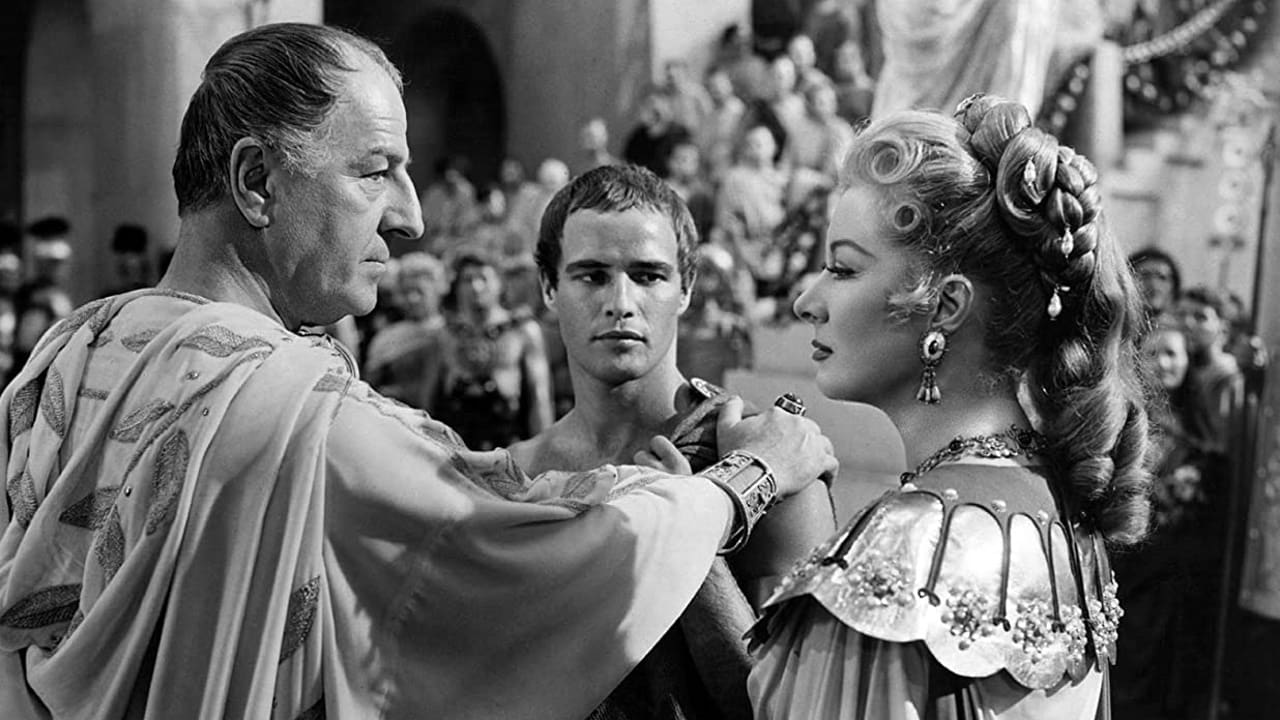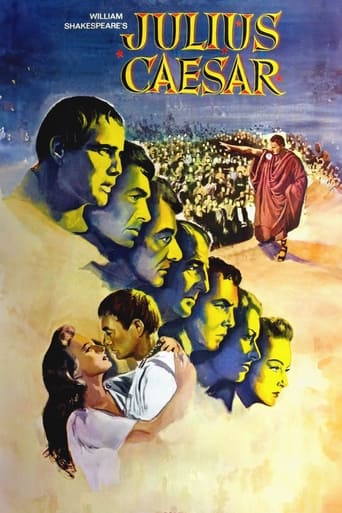Stometer
Save your money for something good and enjoyable
Mjeteconer
Just perfect...
Huievest
Instead, you get a movie that's enjoyable enough, but leaves you feeling like it could have been much, much more.
Jenna Walter
The film may be flawed, but its message is not.
MisterWhiplash
Julius Caesar, the classic story of power corrupting and what happens when it's usurped, is the stuff of a near-masterpiece in 1950's Hollywood. The direction is elegant and timed just right to get the performers on their beats and delivering more and then some. Interesting to see the intensity so LARGE on the fronts of both fronts of British classical-trained theater (John Gielgud, as the most psychologically pathological character, Cassius, fully delivering the goods, plus James Mason being his Mason-iest) and the Method (Brando, seeming like he's always been in these robes - at least this week).It's Shakesepare on Golden-age Hollywood scale, but it's kept intimate when it counts, and the material is allowed to shine fully. This is the Godfather of political dramas, and so many, many lines have been taken into just everyday grammar; aside from the 'fault is not in our stars' line, listen for others like ' O pardon me, thou bleeding piece of earth' or 'it was Greek to me'. And yet it's not simply that these actors get some of the meatiest-dramatic lines ever written, like in the history of all civilizations, but that this is all about what it means to have, take, live with, demolish and get back or keep protected Power, with a capital P.It's almost unfair to give a proper review to the film after seeing it once, as certain big set pieces - or even a couple of the conversations that Cassius has with Brutus or the other Roman senators plotting the death of their "beloved" Caesar - are quite dense with visual touches and details of performance. When Brando has his major set piece (he's not in as much of the film as you might expect, but his presence is felt more, which seems to be a thing with Brando character), addressing the crowd devastated over the loss of their ruler, it's a pinnacle of acting. He isn't just talking to no one, or to himself. He's making it very personal, all the more sad and that the revenge against the betrayers all the more stronger. How to sway a crowd is the name of the dramatic angle here, and it's the stuff of the best Hollywood dramatic acting, writing and direction (and art direction too, what sets) could offer.Is it perfect? Maybe not. The final battle is good but almost, to me, a little short, as if Mankiewicz steps up to make an epic conclusion, but decides to side-step it as if he isn't totally trusting in his capabilities (that would come later, one supposes, with Cleopatra as far as BIG epics went). And yet the final moments with Cassius and Brutus are so effective it makes one want to say nevermind. Especially Gielgud impresses here, with a role that requires a lot of forceful talking, bordering on yelling, with declarations and insinuations and other things - as big as his acting is, just as with Brando and Mason to an extent, though he kind of pulls it back when he can (see the tent scene between Brutus and Cassius before battle), there's subtleties there, little moments you can see the actor working through the emotional logic first, the dense Shakespeare poetry second.As with many Shakesepare movies, it may help being familiar with the play ahead of time to get all of the words and idiosyncracies of the Bard prose. But as far as just the core story goes, it's the stuff of legend. Surely one of those films of the 50's, along with On the Waterfront and Streetcar, where you can run it in an acting school and it might almost be enough to show the movie without any lecture to understand how to command attention from a partner, the audience, the whole world.
Hillary Binet
The movie was alright it was just like the book. Thats how I got to understand the book.Cause the book didn't let get the picture. Even though the character was not the way I imagine them to be. The clothing is different from what I thought. From my perspective reading the book is calm but when it is seen on movie it is different and with action. the two men's that die at the end because they lost the war. In the book it doesn't say soothsayer is blind but in the movie the sooth sayer is blind. The character all do their roles like in the book. In the movie the carpenter is in the crowd and the others was laughing while they was in the public but in the book it didn't explain that part.
GManfred
That's how they might put it in subsequent Brando pictures like "On The Waterfront" or "The Godfather". But "Julius Caesar" was made before Brando became affected and took himself too seriously, and slouched through his roles. Here was an actor, pure and simple, who gave his best and was extremely effective in a demanding part. In fact, he got an Oscar nomination for his portrayal of Marc Antony, and I'll bet what put it over for Academy nominators was his 'friends, Romans' speech. He was excellent, to say the least.This picture had an ensemble cast and you won't find a clinker in the bunch, Head and shoulders above the rest is John Gielgud as Cassius, although as a Shakespearean veteran he had a leg up on the rest. Then comes James Mason as Brutus, followed by Louis Calhern, who seemed a little old and dumpy as Caesar.I have no other Julius Caesar performances to compare it to as I am not a Shakespearean authority, I just love movies. I saw this picture when it first came out but I don't know why - I was only 11. So, from a layman's point of view I thought it was somewhat stagebound (by necessity, I guess, but couldn't The Speech have been given outdoors? It was supposed to take place outdoors) and with an artificial, antiseptic look I can't explain. Not really trying to nitpick or to denigrate a first-class production, just trying to put down my own thoughts.
romanorum1
Both the play and movie focus more on Brutus than on Caesar. Many of the personalities of the Late Roman Republic are featured: Caesar, Casca, Brutus, Cassius, Cicero, Cimber, Calpurnia, Portia, Octavian, etc.Summary: The movie commences on the Feast of the Lupercalia (15 February 44 BC). Serious Cassius convinces the "noble" Brutus and superstitious Casca to join the conspiracy against Caesar, whom they fear could become king, even though he turned down the title of Rex three times. Soothsayers have warnings and there are portents in the weather. Portia, Brutus' wife and the daughter of Cato the Younger, loves her husband but is suspicious of his intentions. Calpurnia, the last wife of Caesar, has a terrible dream the night before the fateful day – Caesar's statue spouted blood – and thus tries to prevent Caesar from leaving their house to go to the Senate House on the Ides of March (15 March 44 BC). But Caesar laments that folks might think badly of him if he stays home. On the way to the Senate House Caesar is given written details of the senatorial plot against him by Trebonius, but he does not read the manuscript. Inside the building, Caesar is surrounded by the conspirators and is stabbed to death at a statue of Pompey; Brutus delivers the mortal blow ("Et tu, Brute?"). At this point the movie is not quite half over. The sullen Marc Antony, a partisan of Caesar, initially plays a waiting game. Brutus in his bloody toga addresses the crowd. He says he had always loved Caesar, but loves Rome more (he hated Caesar the politician, who was more king than traditional republican). By contrast, Cassius has always hated Caesar the person. Matters go against Brutus (and the assassins) when Marc Antony eloquently addresses the mob ("Friends, Romans, Countrymen, lend me your ears!"), reminds them of Caesar's accomplishments, and provides details of Caesar's will. Caesar has left 75 drachmas for every Roman citizen plus a people's park. The conspirators flee Rome, and the Civil War begins. The triumvirs – Marc Antony, Lepidus, and Octavian – are aligned against the assassins. The night before the Battle of Philippi Caesar's ghost appears to Brutus. The triumvirs defeat the conspirators in the battle, and both Cassius and Brutus perish. Because his motives were only political and he loved Caesar alone of all the conspirators, Brutus is eulogized by his enemy Marc Antony as "the noblest Roman of them all" and the melodrama ends.Historical fact: Caesar was known for his famous clemency ("clementia") that he often granted to his defeated rivals, including Brutus. The problem was that many of those whom he forgave still turned against him, and many formed a conspiracy against him. Brutus has an extreme moral dilemma as he not only assassinated a person, but also killed a man who forgave him on more than one occasion.

